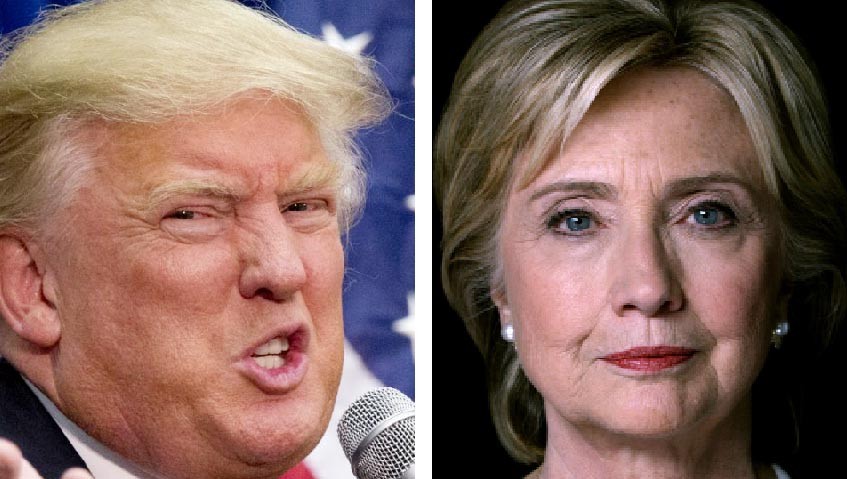
In the run-up to the presidential race, how do Donald Trump and Hillary Clinton view Pakistan…

There are more than four million South Asian-Americans and about 2.7 million of them are US citizens, according to media reports. They are politically active which makes them sought-after voters. In public speeches and behind closed-door fundraisers, presidential candidates usually hint at what they may have in store for them.
The Republican Party’s nominee Donald J. Trump recently addressed a large gathering organised by the Republican Hindu Coalition in New Jersey. Reportedly, there were more than 5000 Indian-Americans in attendance, and the event lasted for around five hours.
Pakistani-Americans, however, have not been able to display as much strength.
At the event, Trump said, "I am a big fan of Hindu [sic], and I am a big fan of India", and then added, "If I am elected president, the Indian and Hindu community will have a big friend in the White House."
He also expressed appreciation of India’s partnership with the US "in the fight against radical Islamic terrorists", and further stressed that both countries "are going to be best friends". This blatant show of affection was not just for the audience present there. Trump applauded the Indian Prime Minister, Narendra Modi, and said that he is looking forward to working with him.
Such admiration for India and its PM Modi is not restricted to the Republican Party and its presidential candidate. The current administration has been flirting with India and Modi for long. During Modi’s last visit to the US, he called Obama, "my close friend", who in return addressed the prime minister as "my friend".
These ‘friendly’ ties with India have not come about in the last few months, though. Years ago, the Indian diaspora with the able backing of the Indian government formed a congressional caucus. Till 2004, the only country-specific caucus in the US Senate was the India Caucus. Interestingly, it was co-founded by the then Senator from New York, Hillary Clinton. "I am delighted to be the Senator from Punjab [India] as well as from New York," she once declared.
If in elected the US president, Hillary R. Clinton, is likely to continue with12 President Obama’s policy on India. However, she might have a different approach towards Afghanistan and Pakistan.
The US has had a change of heart for Pakistan lately. It is vehemently asking for a stern action against terrorist outfits allegedly residing in Pakistan and enhanced safety measures for nuclear assets.
During her tenure as Secretary of State, Hillary Clinton admitted that the US left Pakistan in hot waters after Russia withdrew from Afghanistan. But later she warned the country out loud, "you can’t keep snakes in your backyard and expect them only to bite your neighbors".
Clinton has dealt with Pakistan on issue as grave as Osama bin Laden raid, Salala killings, and Kerry Lugar Berman bill. In a bid to improved relations with Pakistan, she visited Islamabad in 2011, where she iterated that the ‘Enhanced Partnership with Pakistan Act’ was a non-military aid.
Compared to Trump, Clinton has far more experience in dealing with the South Asian region. In a fundraiser in February this year, she expressed concern over the possibility of Pakistan’s nuclear weapons falling into the hands of jihadists, which thought is "a threatening scenario".
The Pakistani media ignored this important bit of information.
The New York Times reported that during a closed-door meeting, Clinton said, "Pakistan is running full speed to develop tactical nukes in their continuing hostility with India," and added, "we live in fear that they’re going to have a coup, that jihadists are going to take over the government, they’re going to get access to nuclear weapons, and you’ll have suicide nuclear bombers. So, this could not be a more threatening scenario."
At the same fundraiser, she remarked, "This is one of the most dangerous developments imaginable".
It would be safe to say that if elected the president she would work to counter any such possibility.
Interestingly, Trump has also expressed concern on the security of Pakistan’s nuclear arsenal, "because of the country’s chronic instability". In another interview Trump offered to resolve the Pakistan-India rift -- "If it was necessary I would do that. If we could get India and Pakistan getting along, I would be honored to do that. That would be a tremendous achievement. I think if they wanted me to, I would love to be the mediator or arbitrator," he said.
Clearly conflict in South Asia is a fundamental political reality for the two candidates. The current administration considers that all outstanding issues between Pakistan and India are bilateral. It has repeatedly suggested that the two countries need to resolve the Kashmir issue through mutual dialogue. Clinton has worked with Obama’s team and might continue with the same policy. On the other hand, Trump’s South Asia policy is still in the making.